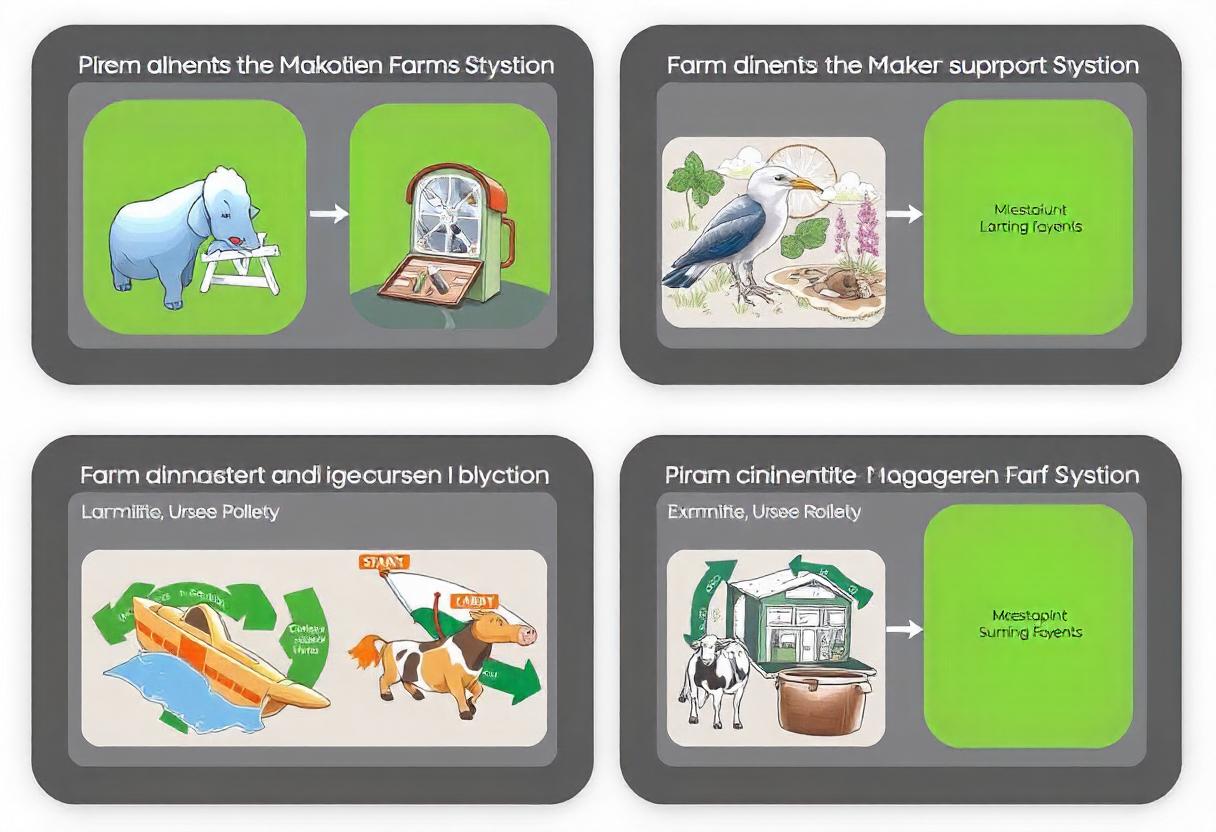
Introduction to Farm Management
Farm management involves the strategic planning, implementation, and monitoring of agricultural practices to maximize productivity, sustainability, and profitability. It requires a systematic approach to resource allocation, crop planning, livestock management, and financial oversight. Effective farm management balances the technical, financial, and environmental aspects of farming to ensure long-term viability.
Key Components of Farm Management
Farm management is composed of several core areas that farmers need to address to maintain efficient operations. These include:
- Resource Management: This involves managing land, water, labor, and other essential resources. Proper resource management ensures that farms remain sustainable and efficient.
- Crop and Livestock Planning: Decisions about what crops to grow or what livestock to raise depend on market demand, climate, and farm resources. Planning helps maximize the farm’s output while minimizing risks.
- Financial Management: Successful farm management requires careful budgeting, cost tracking, and financial planning. This ensures that farmers can sustain their operations while achieving profitability.
- Risk Management: Agricultural activities are exposed to several risks, including weather fluctuations, pest infestations, and market volatility. Effective farm management includes implementing strategies to mitigate these risks.
Decision Support Systems in Agriculture
Decision Support Systems (DSS) are tools or platforms that assist farmers in making data-driven decisions. These systems integrate data from various sources such as weather forecasts, soil analysis, and crop health reports to provide actionable insights.
Types of Decision Support Systems for Farm Management
Farmers use various types of DSS to streamline decision-making. These systems can vary based on their functionality and the types of data they process.
- Farm Management Information Systems (FMIS): FMIS integrates data across different aspects of farm operations—such as production, finance, and personnel management—into one platform. This helps farmers track their inputs, monitor their outputs, and make informed business decisions.
- Precision Agriculture DSS: These systems use sensors, drones, and satellite data to monitor crop health, soil conditions, and moisture levels. They provide real-time information, allowing farmers to optimize inputs like water, fertilizer, and pesticides.
- Climate-Smart DSS: These systems incorporate climate data to help farmers adapt their practices in response to changing weather patterns. They are particularly useful for farmers in regions prone to extreme weather conditions, where proper planning is essential for protecting crops.
Importance of Data in Farm Management
Data plays a critical role in modern farm management and decision support systems. Farmers rely on accurate and timely data to make better decisions regarding crop rotations, irrigation, fertilization, and harvesting schedules. The availability of historical and real-time data helps optimize farm performance and mitigate risks.
- Soil Data: Soil moisture and nutrient levels are key parameters that influence crop productivity. By integrating soil data with decision support systems, farmers can determine the best time for planting and fertilizing.
- Weather Data: Weather forecasts and climate models are vital for farm planning. DSS tools help farmers anticipate and respond to weather events, ensuring that they take necessary precautions to protect their crops.
- Market Data: Price trends and market demand also influence farm management decisions. DSS tools provide farmers with market insights, enabling them to make informed decisions about when and what to sell for maximum profit.
Benefits of Decision Support Systems in Farm Management
The integration of DSS in agriculture offers numerous benefits, including:
- Improved Efficiency: By using data-driven tools, farmers can optimize their inputs and increase output while minimizing waste and resource use.
- Increased Profitability: DSS helps farmers make informed financial decisions, leading to better cost management and improved revenue streams.
- Sustainability: DSS promotes sustainable farming practices by providing insights into resource management, which helps conserve water, reduce chemical usage, and enhance soil health.
- Risk Reduction: These systems help farmers predict and mitigate potential risks such as weather damage or pest infestations.
Challenges in Implementing Decision Support Systems
Despite their benefits, there are challenges associated with adopting DSS in farm management.
- Cost: High upfront costs for acquiring and maintaining DSS tools can be a barrier for small-scale farmers.
- Data Complexity: Interpreting the vast amounts of data generated by these systems requires technical skills that many farmers may lack.
- Infrastructure Limitations: In some rural areas, limited access to the internet and advanced technologies can restrict the use of sophisticated DSS platforms.
Future of Farm Management and DSS
The future of farm management is increasingly intertwined with technology. As agriculture continues to embrace digital transformation, the role of decision support systems is expected to grow. Innovations such as artificial intelligence (AI), machine learning, and the Internet of Things (IoT) will further enhance DSS capabilities, offering more precise and predictive insights to farmers.